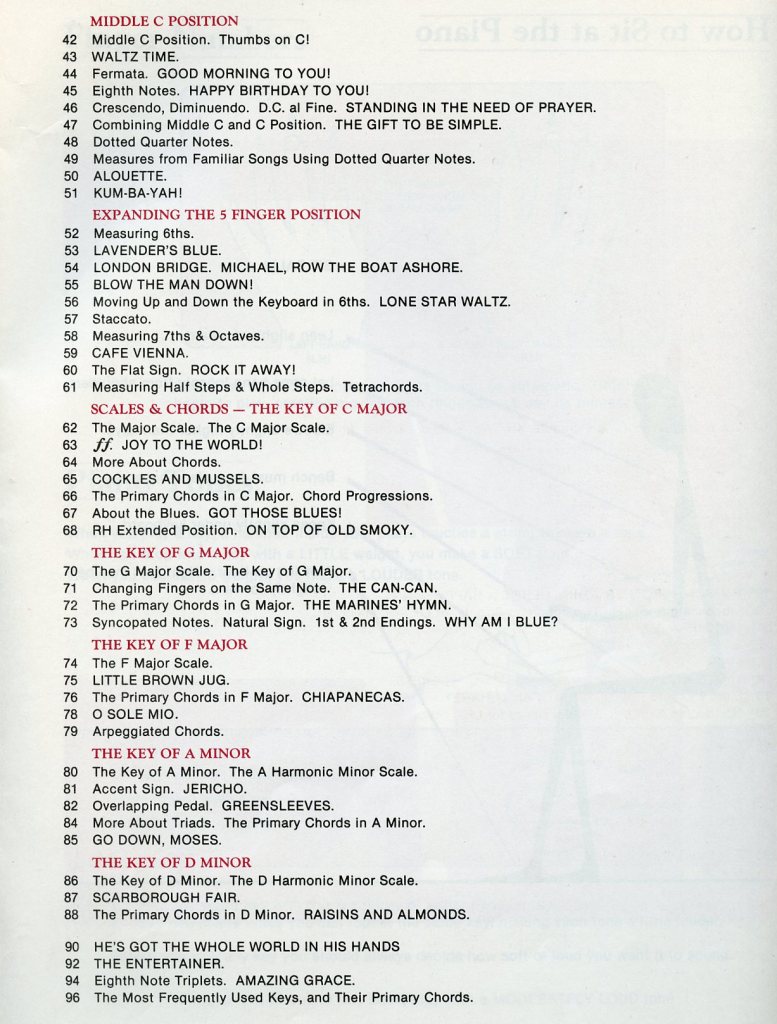Have any of you been learning (or relearning) to play the piano while sheltering in place?
These Alfred’s Basic Adult Piano Course books are the lesson books I used when I was teaching myself how to play piano many years ago. I mention this primarily to illustrate that they are accessible sorts of textbooks, good for beginners.

Back in those early days I would sometimes encourage myself by writing “PRACTICE” atop a page once I’d begun to work through that lesson. I practiced often, and some songs were perhaps a bit tiresome to certain family members… say, a younger brother who had apparently wearied of a tune called “Beautiful Brown Eyes,” which was offered as an exercise in playing broken chords. Broken record, more like! As I page through the lesson book now, I see that my younger brother once scrawled the words “DO NOT” in front of that particular “PRACTICE.” Oops!
There are even a few pieces in these Alfred’s instruction books that I still play from time to time, simply because I enjoy the arrangements. In Book Three, the lesson on the key of C Minor features “Variations on a Sea Chanty,” which invokes that salty old song about “The Drunken Sailor.” The variations here still satisfy me, ranging from rhythmic verses to a few quavering measures before rounding out the piece with sweeping flourishes. “What shall we DO with a drunken sailor?” Distressing details aside, we shall underscore the dilemma with a potent mix of piano stylings.
The stately, simple, and heartfelt rendition of “Amazing Grace” in Book One has a cleansing energy. It’s the sort of piece that I play to tap into a gentle stillness.
And I remember how it amused me to find “Go Down, Moses” in Book One, because that’s the song that Cameron Frye warbles as he stagnates pathetically in bed one fateful morning before his friend Ferris Bueller comes over and suggests that there might be a better way to spend a day off. You remember? Poor Cameron could barely muster the energy to plead, “Let my Cameron go!”

Then there’s the plaintive (and apparently playful) Yiddish folk song, “Tumbalalaika,” out of Book Two. Both love song and riddle song, it wouldn’t feel out of place in a show like “Fiddler on the Roof.” I just did some research online and learned that the tune was featured in Tony Kushner’s “Angels in America,” including the HBO adaptation, in which Meryl Streep (as the ghost of Ethel Rosenberg) croons “Tumbalalaika” to Roy Cohn (Al Pacino) on his deathbed.
I also came across this delightful video of Pete Seeger and folklorist Ruth Rubin singing and discussing “Tumbalalaika.” (“It’s got a chorus that anybody can join in on,” muses Seeger as he recounts performing the tune in many countries.) At one point, Seeger even turns amiably to the camera and invites viewers to chime in: “Say, let’s get anybody who’s watching… you’re foolish if you don’t sing along with us.” He’s speaking to an audience from decades ago, but thanks to the magic of film and the Internet, his invitation extends to us, to audiences present and future as well.
So, I learned about this old Russian-Jewish melody in a piano lesson book, and long after I mastered the exercise, the song’s minor chords still resonate. Many’s the time that an instruction book or a beginner collection has pointed me to or reconnected me with pieces of music, from folk songs and old pop songs to hymns and lullabies and simplified versions of well-known symphonies or operatic tunes. I suppose it’s one of the gifts of playing an instrument; it’s another way of being a voracious reader. You can be busy with practicalities — making sense of chord progressions or learning trills — but often you’re also absorbing hints of stories, connecting with the music and therefore with the lives of people and communities who came before. In fact, in the introduction to his own collection, “American Favorite Ballads,” Pete Seeger celebrates the magic of how songs get handed down through generations and brought to life again and again. “Let us… be glad,” he exhorts us, “…that we are part of the chain.”
Where to find them: “Alfred’s Basic Adult Piano Course: Lesson Books (Levels One, Two, and Three)” By Willard A. Palmer, Morton Manus, and Amanda Vick Lethco SONGBOOK: purchase “Alfred’s Basic Adult Piano Course: Lesson Books” on Amazon and on Alfred.com. Publisher: Alfred Music (1983) ISBN: 0882846163 (Level One), 0882846345 (Level Two), 0882846361 (Level Three) Status (2020): In Print





